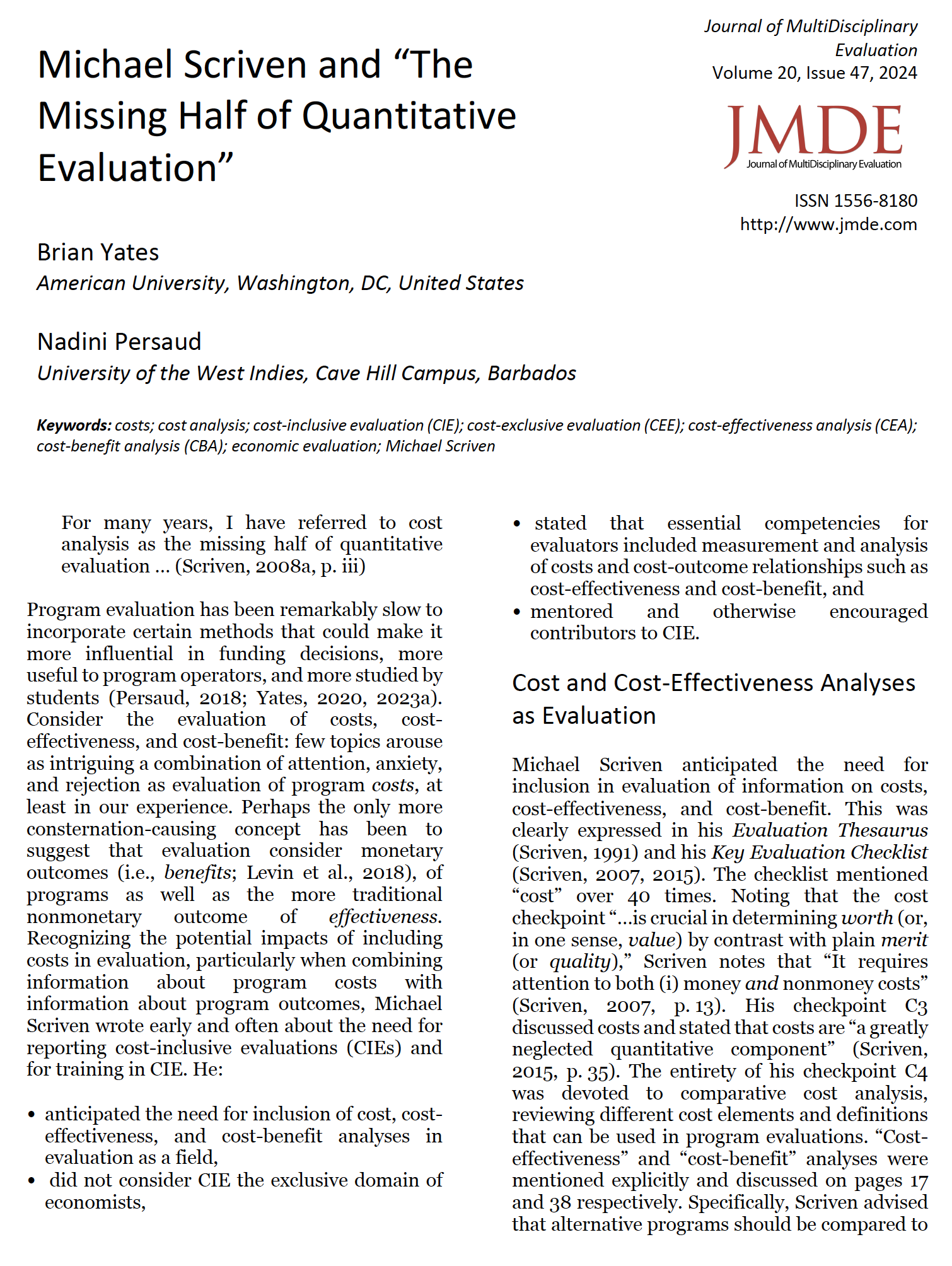Michael Scriven and “The Missing Half of Quantitative Evaluation”
Main Article Content
Abstract
Although Michael Scriven is one of the most recognized parents of program evaluation in general, it may be surprising to learn that he also was a founder of cost-inclusive evaluation (CIE) in particular. CIE incorporates into evaluations information on the amounts, types, and monetary values of resources used by programs to achieve outcomes, and, increasingly, the monetary value of those outcomes (Herman et al., 2009; Persaud & Yates, 2023; Yates, 1996). Michael Scriven blazed a trail toward routine use of cost, cost-effectiveness, and cost-benefit analyses by emphasizing that evaluations should measure costs as well as nonmonetary and monetary outcomes, and should compare costs and outcomes for alternative programs in cost-effectiveness and cost-benefit analyses. Scriven also was emphatic that CIE be recognized as a core evaluator competency. Noting that “cost analysis” in evaluation was “the missing half of quantitative evaluation” (Scriven, 2008a, p. iii), he did not immediately succeed in convincing most evaluators that program costs, and monetary program outcomes, were essential to assess. However, his publications, his supervision, and his encouragement of junior colleagues legitimized and recognized CIE as nothing else could.
Downloads
Article Details

This work is licensed under a Creative Commons Attribution-NonCommercial 4.0 International License.
Copyright and Permissions
Authors retain full copyright for articles published in JMDE. JMDE publishes under a Creative Commons Attribution-NonCommercial 4.0 International License (CC BY - NC 4.0). Users are allowed to copy, distribute, and transmit the work in any medium or format for noncommercial purposes, provided that the original authors and source are credited accurately and appropriately. Only the original authors may distribute the article for commercial or compensatory purposes. To view a copy of this license, visit creativecommons.org
References
Coryn, C. L. S., & Scriven, M. (2007). Are national-level research evaluation models valid, credible, useful, cost-effective, and ethical? Journal of MultiDisciplinary Evaluation, 4(8), 92–96. https://doi.org/10.56645/jmde.v4i8.32 DOI: https://doi.org/10.56645/jmde.v4i8.32
Davidson, J. E. (2005). Evaluation methodology basics: The nuts and bolts of sound evaluation. Sage. https://doi.org/10.4135/9781452230115 DOI: https://doi.org/10.4135/9781452230115
Herman, P., Avery, D. J., Schemp, C. S., & Walsh, M. E. (2009). Are cost-inclusive evaluations worth the effort? Evaluation and Program Planning, 32(1), 55–61. https://doi.org/10.1016/j.evalprogplan.2008.08.008 DOI: https://doi.org/10.1016/j.evalprogplan.2008.08.008
Kazdin, A. E. (2003). Research design in clinical psychology (4th ed.). Allyn and Bacon.
King, J. (2018). Expanding theory-based evaluation: Incorporating value creation in a theory of change. Evaluation and Program Planning, 89, 101963. https://doi.org/10.1016/j.evalprogplan.2021.101963 DOI: https://doi.org/10.1016/j.evalprogplan.2021.101963
King, J. (2019). Evaluation and value for money: Development of an approach using explicit evaluative reasoning [Doctoral dissertation, Melbourne Graduate School of Education]. http://hdl.handle.net/11343/225766
Kirkhart, K. E., & Scriven, M. (1989). Conceptualizing evaluation: The Key Evaluation Checklist. In D. M. Mertens (Ed.), Creative ideas for teaching evaluation: Activities, assignments, and resources (pp. 49–71). Springer Dordrecht. https://doi.org/10.1007/978-94-015-7829-5_3 DOI: https://doi.org/10.1007/978-94-015-7829-5_3
Levin, H. M. (1975). Cost-effectiveness analysis in evaluation research. In M. Guttentag & E. L. Struening (Eds.), Handbook of evaluation research (Vol. 2, Chap. 5). Sage.
Levin, H. M., McEwan, P. J., Belfield, C., Bowden, A. B., & Shand, R. (2018). Economic evaluation in education: Cost-effectiveness and benefit-cost analysis (3rd. ed.). Sage. https://doi.org/10.4135/9781483396514 DOI: https://doi.org/10.4135/9781483396514
New Zealand Treasury. (2005). Cost benefit analysis primer. The Treasury.
Persaud, N. (2007). Conceptual and practical analysis of costs and benefits in evaluation: Developing a cost analysis tool for practical program evaluation [Doctoral dissertation, Western Michigan University]. ProQuest. https://www.proquest.com/docview/304815206/
Persaud, N. (2018). A practical framework and model for promoting cost-inclusive evaluation. Journal of MultiDisciplinary Evaluation, 14(30), 88–104. https://doi.org/10.56645/jmde.v14i30.494 DOI: https://doi.org/10.56645/jmde.v14i30.494
Persaud, N., & Yates, B. T. (2023). Cost-inclusive evaluation: Planning it, doing it, using it. Guilford.
Rogers, P. J., Stevens, K., & Boymal, J. (2009). Qualitative cost-benefit evaluation of complex, emergent programs. Evaluation and Program Planning, 32, 83–90. https://doi.org/10.1016/j.evalprogplan.2008.08.005 DOI: https://doi.org/10.1016/j.evalprogplan.2008.08.005
Scriven, M. (1969). An introduction to meta-evaluation. Educational Projects Report, 2, 36–38.
Scriven, M. (1991). Evaluation thesaurus (4th ed.). Sage.
Scriven, M. (1993). Parting perspectives. New Directions for Program Evaluation, 58, 87–92. https://doi.org/10.1002/ev.1646 DOI: https://doi.org/10.1002/ev.1646
Scriven, M. (1996). Types of evaluation and types of evaluator. Evaluation Practice, 17(2), 151–61. https://doi.org/10.1177/109821409601700207 DOI: https://doi.org/10.1016/S0886-1633(96)90020-3
Scriven, M. (2007). Key Evaluation Checklist. https://wmich.edu/sites/default/files/attachments/u350/2014/key%20evaluation%20checklist.pdf
Scriven, M. (2008a). Editorial: Cost analysis in evaluation. Journal of MultiDisciplinary Evaluation, 5(9), iii. https://doi.org/10.56645/jmde.v5i9.176 DOI: https://doi.org/10.56645/jmde.v5i9.176
Scriven, M. (2008b). The economist’s fallacy. Journal of MultiDisciplinary Evaluation, 5(9), 74–76. https://doi.org/10.56645/jmde.v5i9.184 DOI: https://doi.org/10.56645/jmde.v5i9.184
Scriven, M. (2009). Meta-evaluation revised. Journal of MultiDisciplinary Evaluation, 6(11), iii–viii. https://doi.org/10.56645/jmde.v6i11.220 DOI: https://doi.org/10.56645/jmde.v6i11.220
Scriven, M. (2015). Key Evaluation Checklist. https://wmich.edu/sites/default/files/attachments/u1105/2023/kec-scriven.pdf
Scriven, M. (2019). The checklist imperative. New Directions for Evaluation, 163. https://doi.org/10.1002/ev.20374 DOI: https://doi.org/10.1002/ev.20374
Yates, B. T. (1994). Toward the incorporation of costs, cost-effectiveness analysis, and cost-benefit analysis into clinical research. Journal of Consulting and Clinical Psychology, 62, 729–736. https://doi.org/10.1037/0022-006X.62.4.729 DOI: https://doi.org/10.1037/0022-006X.62.4.729
Yates, B. T. (1996). Analyzing costs, procedures, processes, and outcomes in human services: An introduction. Sage Publications. https://doi.org/10.4135/9781412983358 DOI: https://doi.org/10.4135/9781412983358
Yates, B. T. (2012). Step arounds for common pitfalls when valuing resources used versus resources produced. New Directions in Program Evaluation, 133, 43–52. https://doi.org/10.1002/ev.20005 DOI: https://doi.org/10.1002/ev.20005
Yates, B. T. (2020). Research on improving outcomes and reducing costs of psychological interventions: Toward delivering the best to the most for the least. Annual Review of Clinical Psychology, 16, 125–150. https://doi.org/10.1146/annurev-clinpsy-071519-110415 DOI: https://doi.org/10.1146/annurev-clinpsy-071519-110415
Yates, B. T. (2021). Toward collaborative cost-inclusive evaluation: Adaptations and transformations for evaluators and economists. Evaluation and Program Planning, 89, 101993. https://doi.org/10.1016/j.evalprogplan.2021.101993 DOI: https://doi.org/10.1016/j.evalprogplan.2021.101993
Yates, B. T. (2023a). Program evaluation: Outcomes and costs of putting psychology to work. In H. Cooper, M. N. Coutanche, L. M. McMullen, A. T. Panter, D. Rindskopf, & K. J. Sher (Eds.), APA handbook of research methods in psychology: Research designs: Quantitative, qualitative, neuropsychological, and biological (2nd ed., pp. 725–743). American Psychological Association.
Yates, B. T. (2023b). Cost-inclusive research on health psychology interventions: Why, how, and what next. Health Psychology, 42(3), 139–150. https://psycnet.apa.org/doi/10.1037/hea0001280 DOI: https://doi.org/10.1037/hea0001280

